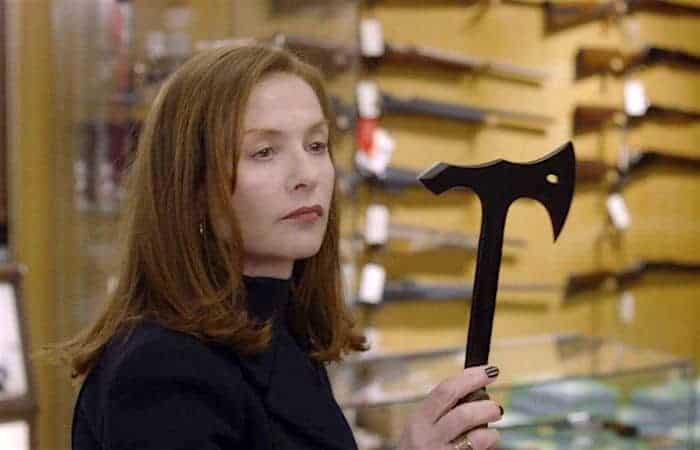Those squeamish viewers who found Manchester by the Sea difficult to watch will find Paul Verhoeven’s new film, Elle, way too much to handle. Refreshingly non-formulaic (i.e. non Hollywood), the film stars a stunning Isabelle Huppert as a successful Parisian, Michele LeBlanc, whose animated fantasy film company specializes in erotic violence. The film opens with a voyeur’s view of her rape, and ends, well, with a whole lot more. Huppert once again shows—as she did in The Piano Teacher—that she can, and will, do anything required by the sort of 100% adult cinema in which European filmmakers specialize. Oscar please!
So eccentric, provocative, satirical, and violent is Elle that I find it difficult to be sure of any one aspect of it. In other words, it’s hard to say what I saw and how I can interpret a film that lacerates all the genres it vivaciously defies. A black comedy of bourgeois manners, Elle skewers French elegance and 21st century family dysfunction, takes aim at infidelity—something our protagonist Michele LeBlanc indulges when it strikes her fancy—and exposes the fraudulence in most conventional relationships, with one or two exceptions.
 Back-tracking every now and then to reveal more and more important yet incomprehensible bits of Michele’s past, Elle‘s heart is bloodied by the horrific incident involving her father back when Huppert’s character was a young girl. Haunted, yet defiant about this past, Michele coolly ignores her friend’s urgings to tell the police about her recent violent rape. Instead she decides to get even.
Back-tracking every now and then to reveal more and more important yet incomprehensible bits of Michele’s past, Elle‘s heart is bloodied by the horrific incident involving her father back when Huppert’s character was a young girl. Haunted, yet defiant about this past, Michele coolly ignores her friend’s urgings to tell the police about her recent violent rape. Instead she decides to get even.
But Michele LeBlanc is no Charles Bronson on a systematic binge of revenge, and in fact her relationship with her rapist turns out to be as unnerving as every other other one in her life. With her failed novelist ex-husband, her best friend (whose husband is Michele’s current lover), her son and his spoiled abusive girlfriend, and the handsome neighbor with whom she has unexpectedly dangerous liaisons. This film is so unpredictable, so laser focused that you have to be willing to fling yourself into the action and simply have faith that the magnificent Huppert will take you somewhere both unexpected and somehow redemptive. (Or whatever the post-truth version of redemptive might be.) She does both, and much more. It’s often tough to watch, and just as often potently funny. (Six people walked out of the theater after the first ten minutes.)
No cow is too sacred to be slapped around by Verhoeven and his lead actor. Huppert’s face is a landscape of human disappointment, cleverness, longing, and impatience. Mercurial as a skyful of hurricane clouds, she drives almost every moment of the film, forcing us to love, loathe, and champion her intelligence and her guts. Few actors have ever been put through so much raw physical ordeal—and all of it clothed in layers of emotional inquiry. The pursing of lips, a raised eyebrow, a clenched fist. The suddenly raised eyes.She is a galaxy of human-all-too-human gestures and cynical insights. Not a Disney film. What a ride!


